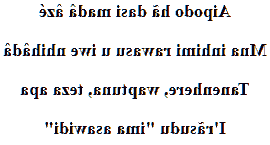Xavánte love poem
Dasi madâ âzé
Aipodo hã dasi madâ âzé
Mna inhimi rawasu u iwe nhihâdâ
Tanenhere, waptuna, teza apa
I'rãsudu "ima asawidi"


→ French poem ←
Xavánte language
Xavánte (A'uwe Uptabi, A'we, Akuên, Awen, Shavante, Chavante, Tapacua, Crisca, Pusciti, autonym A'uwẽ, Akwén), is a macro-jê language spoken by the Xavántes in eastern Mato Grosso, Brazil.
No more than 10,000 people, speak this language. They are spread over some 180 villages, themselves spread over several Indigenous Lands, in 7 reserves, in the south-east of Mato Grosso, in the central-western region of Brazil (Sangradouro-Volta Grande, São Marcos, Areões, Marechal Rondon, Parabubure, Maraiwatsede and Pimentel Barbosa). 30% of them are bilingual and also speak Portuguese.
Among the Xavántes, it is generally more women who in contact with missionaries have a base of Portuguese. Like other macro-jê languages, xavánte has some distinctions when it is spoken by a man or a woman. At the lexical level there would be only one separate word in xavánte: the word thing = marĩ (for a man) = tiha (for a woman), the other distinctions are through markers.
The Xavántes
The Xavántes are one of the most studied and also the most numerous indigenous groups in Brazil. Their population is young, with a significant number of young children.
Originally the Xavántes were in the state of Goiás, in the 19th century they moved a little further west ... Contacts with Europeans (missionaries) are quite recent (20th century) and have been quite destructive for their culture.
Currently the Xavántes live in "reserves" and if they keep their hunting practices, as they must stay on their territory, this does not allow them to follow the prey very far.
Their reservations are generally made up of semi-circular villages, typical of the Gê groups. The houses are placed in an arc according to a well-defined social order, and the Xavantes live in extended families, and in uxorilocal residence, inside which, the space for each is delimited in a very precise way.
Often marriages are made and repeated within the same two families. For example, it is common for brothers or sisters to marry the brother or sister of their brother-in-law or sister-in-law. It is also not uncommon for a man to marry his wife's sister (s). This makes the traditional pattern of day-to-day life among the Xavantes quite complex.